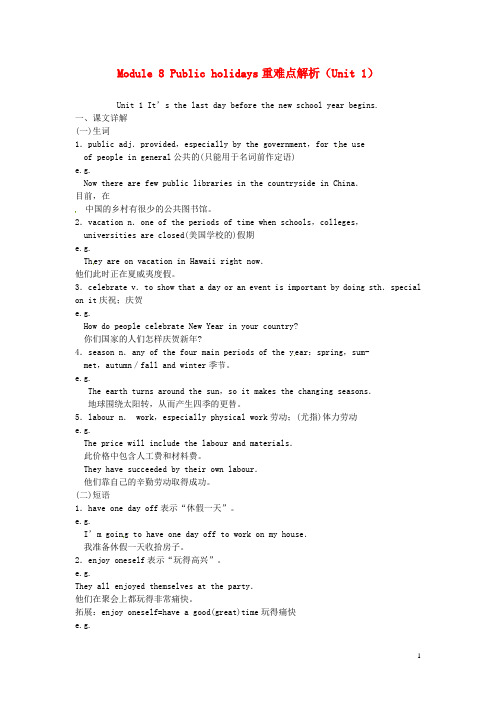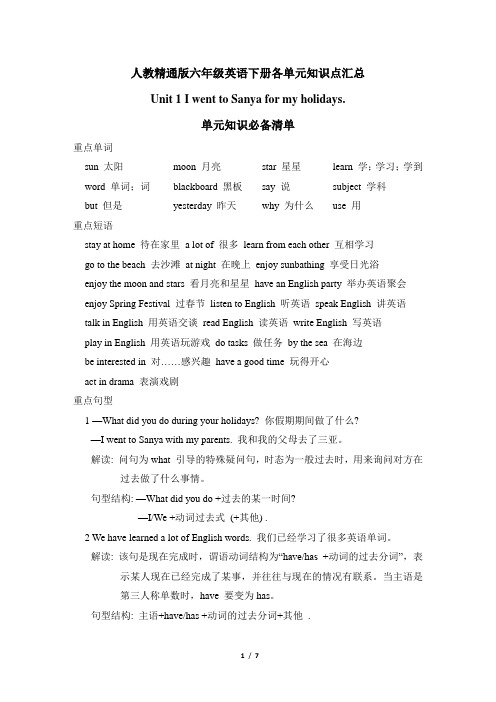Holidays知识点归纳.
Module 2 Unit 1 外研版英语九年级上册知识点详解

外研版九(上)Module 2 Public holidays知识点详解Unit 1 My family always go somewhere interesting as soon as the holiday begins.★(A2).【知识点再现】The First of October is China’s National Day, isn’t it, Lingling? 玲玲,10月1日是中国的国庆节,对吗?【知识点1】the First of October 意为“十月一号”。
英语年月日的表达“在英国英语中,通常可有两种表达法。
以“1988年5月2日”为例:表达法①:写法:(the) 2 (nd) May, 1988;读法:the second of May, nineteen eighty-eight;表达法②:写法:May (the) 2 (nd), 1988;读法:May the second, nineteen eighty-eight。
如:I was born on March 6th, 1990. 我出生于1990年3 月6日。
读成:I was born on March the sixth, nineteen ninety. 或I was born on the sixth of March, nineteen ninety. 【拓展】①写法中,日期与月份之间不可加逗号;②写法中,年份前的逗号可以省略;③写法中,代表日期的序数词词尾(-st,-nd,-rd或-th)均可省略;④写法中,序数词前的定冠词the,一般可省略(尤其是以序数词开头的场合);但在读法中,该定冠词则不省略。
【知识点2】本句是反意疑问句。
在陈述句之后,附加上一个简短问句,对陈述句所述的事情提出相反的疑问,这种疑问句叫作反意疑问句。
反意疑问句由“陈述句+附加疑问句”两部分构成。
反意疑问句的结构有两种:前肯后否;前否后肯。
八年级英语下册 Module 8 Public holidays重难点解析 外研版

Module 8 Public holidays重难点解析(Unit 1)Unit 1 It’s the last day before the new school year begins.一、课文详解(一)生词1.public adj.provided,especially by the government,for t he useof people in general公共的(只能用于名词前作定语)e.g.Now there are few public libraries in the countryside in China.目前,在中国的乡村有很少的公共图书馆。
2.vacation n.one of the periods of time when schools,colleges,universities are closed(美国学校的)假期e.g.Th ey are on vacation in Hawaii right now.他们此时正在夏威夷度假。
3.celebrate v.to show that a day or an event is important by doing sth.special on it庆祝;庆贺e.g.How do people celebrate New Year in your country?你们国家的人们怎样庆贺新年?4.season n.any of the four main periods of the y ear:spring,sum-met,autumn/fall and winter季节。
e.g.The earth turns around the sun,so it makes the changing seasons.地球围绕太阳转,从而产生四季的更替。
5.labour n. work,especially physical work劳动;(尤指)体力劳动e.g.The price will include the labour and materials.此价格中包含人工费和材料费。
春节英语的知识点

春节英语的知识点每一个节日都有它存在的意义,那么你知道这些节日有哪些知识点呢?想要成为宣传我国传统节日的友好大使。
下面,小编在这给大家带来春节英语的知识点,欢迎大家借鉴参考!新春佳节传统中国节日 traditional Chinese festival农历 lunar calendar腊八节 Laba Festival小年 Little New Year除夕 Lunar New Year's Eve春节 the Spring Festival正月初一 Lunar New Year's Day元宵节 the Lantern Festival正月 the first month of the lunar year二月二龙抬头 Dragon Heads-raising Day春节的英文常用词语过年 have the Spring Festival对联 poetic couplet: two successive rhyming lines in poetry 春联 Spring Festival couplets剪纸 paper-cuts年画 New Year paintings买年货 special purchases for the Spring Festival ; do Spring Festival shopping敬酒 propose a toast灯笼 lantern: a portable light灯会 exhibition of lanterns守岁 staying-up拜年pay New Year's call; give New Year's greetings; New Year's visit禁忌 taboo去晦气 get rid of the ill- fortune祭祖宗 offer sacrifices to one's ancestors压岁钱 gift money; money given to children as a lunar New Year gift辞旧岁 bid farewell to the old year扫房 spring cleaning; general house-cleaning八宝饭 eight treasures rice pudding糖果盘 candy tray什锦糖 assorted candies - sweet and fortune蜜冬瓜 candied winter melon - growth and good health西瓜子 red melon seed - joy, happiness, truth and sincerity 金桔 cumquat - prosperity糖莲子 candied lotus seed - many descendents to come糖藕 candied lotus root - fulfilling love relationship红枣 red dates - prosperity花生糖 peanut candy - sweet春节的英文祝福语给父母亲Mom and Dad: Thank you for everything on this holiday season!爸爸妈妈:值此佳节,感谢您们所给予的一切。
初中英语知识点归纳询问和回答节日庆祝的词汇

初中英语知识点归纳询问和回答节日庆祝的词汇初中英语知识点归纳:询问和回答节日庆祝的词汇在初中英语学习中,了解和运用与节日庆祝相关的词汇是非常重要的。
这些词汇可以帮助我们和他人进行交流,也能增加我们对文化和传统的了解。
本文将整理一些常用的询问和回答节日庆祝的词汇,希望能够帮助大家更好地掌握这方面的知识。
一、询问节日1. What festival is it today?今天是什么节日?2. Is there any special occasion today?今天有什么特殊的场合吗?3. Are there any festivals coming up?还有什么节日即将到来吗?4. What festivals do you celebrate in your country?在你们国家有哪些节日?5. Do you have any traditional holidays in your culture?你们文化中有传统的节日吗?6. How do you celebrate [name of festival]?你们是如何庆祝【节日名称】的?二、回答节日1. Today is [name of festival].今天是【节日名称】。
2. There is a special occasion today.今天有一个特殊的场合。
3. The upcoming festival is [name of festival].即将到来的节日是【节日名称】。
4. In our country, we celebrate [name of festival].在我们国家,我们庆祝【节日名称】。
5. We have traditional holidays like [name of holiday] in our culture.我们文化中有像【传统节日名称】这样的节日。
6. We celebrate [name of festival] by [activities].我们通过【活动】来庆祝【节日名称】。
四年级上册英语unit 2 知识点归纳

Unit 2 Our holidays一. 重点单词1.photo 照片2. song 歌曲3.year 年4.poem 诗歌5.soon不久7.tomorrow 明天8.then 然后二.重点词组1. have a look 看一下2. National Day 国庆节3. on Mother’s Day 在母亲节4. Father’s Day 父亲节5. Teacher’s Day/ Teachers’ Day 教师节6. Children’s Day 儿童节7. Christmas Day 圣诞节8. make a card 做卡片9. Tian’anmen Square 天安门广场10. draw a picture 画画11. write soon 盼回信12. write a poem 写一首诗13. sing a song 唱歌14.at the park在公园15.for lunch 午餐三.重点句子1. What are you doing? I am looking at Pat’s photos.你在干什么?我在看帕特的照片。
2. What’s Pat doing?She is writing a poem for Teacher’s Day.帕特在干什么?她在为教师节写一首诗。
3. What’s Pat doing?She’s drawing a picture for Natio nal Day.帕特在干什么?她正在为国庆节画画。
4. What’s Pat doing?She’s singing a song for Children’s Day.帕特在干什么?她正在为儿童节唱歌。
5. What’s Pat doing?She’s making a card for Christmas Day.帕特在干什么?她正在为圣诞节写卡片。
6.Do you like my poem? Yes, I do.你喜欢我的诗吗?是的7.When’s Father’s Day? It’s on June 15 this year.父亲节是什么时候?今年是在6月15日。
holiday是什么意思

holiday是什么意思Holiday是什么意思在我们日常生活中,经常会听到“holiday”这个词,尤其是在度假季节或节假日,但是你真正了解“holiday”的意思吗?这个词在不同的文化和语境中可能有不同的定义和使用方法。
在本文中,我们将探讨“holiday”的几种含义和用法。
首先,我们来了解“holiday”作为一个名词的含义。
通常情况下,“holiday”是指一段时间的放松和休息,人们可以远离日常工作、学习和责任,享受生活的乐趣。
在日常对话中,我们可能会用“holiday”来指代特定的假期,比如圣诞节、复活节、感恩节等。
这些特定的假期通常会有一系列的庆祝活动和传统,人们会放假以便与家人和朋友共度时光。
另外,“holiday”也可以指代一个国家或地区官方规定的节假日,比如劳动节、国庆节等。
这些假期通常是法定假期,人们不需要上班上学,可以放松身心,享受属于自己的个人时间。
在这些特殊的假期里,人们常常会参加各种活动和庆祝仪式,例如观看焰火表演、进行户外运动、举办庆祝游行等。
这些活动可以帮助人们放松身心,增加社交交流,并庆祝特殊的日子。
此外,“holiday”还可以指代一个人选择的度假期间。
人们通常会利用假期去旅行,探索新的地方、文化和经历不同的生活方式。
度假旅行通常包括预订交通工具(如飞机、火车、汽车等)的行程、预订酒店或民宿、制定旅游路线和计划旅游活动等。
人们可以选择在度假期间参观旅游景点、品尝当地美食、体验当地文化以及参加各种特色活动。
度假旅行可以带来充实和放松的体验,也是人们放松心情、摆脱压力的好方式。
此外,在一些特定的语境下,“holiday”还可以指一种宗教节日,比如圣诞节、复活节、哈拉突节等。
这些宗教节日在不同的宗教信仰中有着不同的意义和庆祝方式。
人们会前往教堂祷告、举办宗教仪式以及进行与节日相关的活动。
这些宗教节日是人们表达宗教信仰和寻找心灵安慰的重要时间,也是家庭团聚和欢庆的时刻。
Holiday fun 知识点

Unit 3 Holiday fun一.短语1.holiday fun 假期乐趣e back to school 回到学校3.on National Day 在国庆节4.the National Day holiday 国庆节假期5.call me/you/him/her 打电话给我/你/他/她6.go to the Bund 去上海外滩7.visit the Shanghai Museum 参观上海博物馆8.see many interesting things 看见许多有趣的事物9.the Great Wall 长城10.t he Palace Museum 故宫11.the Summer palace 颐和园12.Tian’anmen Square(不加the) 天安门广场13.on the farm 在农场14.near Star Lake 在星湖附近15.pick some oranges 摘一些橘子16.go fishing 去钓鱼17.catch some fish (fish单复数同行) 抓住一些鱼18.want to do sth. = would like to do sth. 想要做某事19.give sb. sth. = give sth. to sb. 给某人某物20.main school holidays 三个主要的学校假期21.the Easter holiday 复活节假期22.the summer holiday 暑假23.the Christmas holiday 圣诞节假期24.It’s time for dinner = It’s time to have dinner 是吃晚饭的时候了e home late 回家晚了26.have a fashion show 举行一场时装秀27.love beautiful clothes 喜爱漂亮衣服28.be excited about 对……兴奋29.love fashion shows 喜爱时装秀30.wear paper clothes 穿纸衣服31.What great fun! (what+adj+不可数名词) 多么有趣啊!32.ask sb. about sth. 向某人询问某事33. a lot of bottles 许多瓶子34.go well 进展顺利35.be wonderful 精彩的,美妙的36.at first 开始,最初37.at last 最后38.heavy rain 大雨39.too bad 太糟糕了40.the Car Museum 汽车博物馆41.my holiday 我的假期二.单词1. fun funny (形容词)2.after before (对应词)3. was not wasn’t (缩写)4. were not weren’t (缩写)5.did not didn’t(缩写)6.why because 为什么---因为7. bad good (反义词)8. good(形容词)well (副词)9. late early(反义词)三.动词的过去式come came do didcall called go wentsee saw pick pickedcatch caught want wantedeat ate get gotlove loved have hadwear wore ask asked。
人教精通版六年级英语下册各单元知识点汇总

人教精通版六年级英语下册各单元知识点汇总Unit 1 I went to Sanya for my holidays.单元知识必备清单重点单词sun 太阳moon 月亮star 星星learn 学;学习;学到word 单词;词blackboard 黑板say 说subject 学科but 但是yesterday 昨天why 为什么use 用重点短语stay at home 待在家里a lot of 很多learn from each other 互相学习go to the beach 去沙滩at night 在晚上enjoy sunbathing 享受日光浴enjoy the moon and stars 看月亮和星星have an English party 举办英语聚会enjoy Spring Festival 过春节listen to English 听英语speak English 讲英语talk in English 用英语交谈read English 读英语write English 写英语play in English 用英语玩游戏do tasks 做任务by the sea 在海边be interested in 对……感兴趣have a good time 玩得开心act in drama 表演戏剧重点句型1 —What did you do during your holidays? 你假期期间做了什么?—I went to Sanya with my parents. 我和我的父母去了三亚。
解读: 问句为what 引导的特殊疑问句,时态为一般过去时,用来询问对方在过去做了什么事情。
句型结构: —What did you do +过去的某一时间?—I/We +动词过去式(+其他) .2 We have learned a lot of English words. 我们已经学习了很多英语单词。
- 1、下载文档前请自行甄别文档内容的完整性,平台不提供额外的编辑、内容补充、找答案等附加服务。
- 2、"仅部分预览"的文档,不可在线预览部分如存在完整性等问题,可反馈申请退款(可完整预览的文档不适用该条件!)。
- 3、如文档侵犯您的权益,请联系客服反馈,我们会尽快为您处理(人工客服工作时间:9:00-18:30)。
Unit 6 Holidays知识点归纳一、单词1.Christmas 圣诞节2.people 人,人们3.penfriend 笔友4.also 也,5.festival 节日6.spring 春季ntern 灯笼8.relative 亲戚,亲属9.delicious 美味的,可口的10.favourite特别喜爱的,流行的11.Easter复活节12.beach 海滩 14.race赛跑13. popular 多数人喜爱的,流行的 15.dumpling 粽子,团子,饺子16. moon 月亮二、词组1.New Year’s Day 元旦 2.Children’s Day 儿童节 3.Spring Festival 春节4.dress up in costumes身穿圣装5.Mid-Autumn Festival中秋节6.eat moon cake 吃月饼7.May Day 五一劳动节8.at Dragon Boat Festival 在端午节 e after 随后,随之而来10.go to parties 去宴会11.have a big lunch 吃一顿盛大的午餐12.visit their relatives and friends 拜访亲戚朋友13.eat a lot of delicious food 吃许多美味的食物14. last Halloween 去年万圣节15. give presents to your friends 把礼物给你的朋友16.favourite holiday 特别喜爱的节日17.play with lanterns 玩花灯18.watch the moon 赏月19. make pumpkin lanterns做南瓜灯笼20. have a long holiday 有一个长假期21. watch dragon boat races 观看龙舟赛22. eat rice dumplings 吃粽子23. in January or February 在一月或二月24. a popular holiday in China 在中国很流行的节日25.spend time with their family and friends 和家人朋友共渡时光三、句子:1. When’s Spring Festival? It’s in January or February.春节在什么时候?它在一月或二月。
2. What do people usually do at Spring Festival? 在春节人们通常会做什么?They usually eat a lot of delicious food. 他们通常吃许多美味的食物。
3. Did you eat a lot of delicious food last Spring Festival? Yes, I did.去年春节你吃了许多美味的食物了吗?是的。
4. Today, Mr Green is talking to his students about holidays.今天格林老师正在和他的学生们谈论有关节日的事情。
5. My favourite holiday is Halloween. 我特别喜爱的节日是万圣节。
6. Did you have a party on Mid- Autumn Day? No, I didn’t. 你中秋节开晚会了吗?没,没有。
四、语法:1.talk与介词的搭配。
talk to sb.与某人谈话;talk about sth.谈论某事;talk to sb about sth.与某人谈论某事如:Ben is talking to Jack about public signs.(本正在和杰克谈论公共标志。
)2.介词in/on/at的区别。
(1)在表示节日的词前,用介词at。
如:at Spring Festival.(2)在表示具体某一天的词前,用介词on。
如:on New Year’s Day.(3)在表示某月或某年的词前,用介词in。
如:in April, in 2006.3. 由last构成的词组。
last指“刚过去的” ,它可以和其他单词组成许多表示过去的时间状语。
如:last year(去年), last week(上周), last month(上个月), last Monday(上星期一), last Spring Festival(去年春节)等。
4.watch与look, see, read 等词的区别。
(1)look是不及物动词,后面不能直接跟宾语。
强调有意识地“看” ,着重指动作。
look at相当于一个及物动词的短语,其后可以跟宾语。
多用来强调“看”的动作。
(2)see是及物动词,后面可以跟宾语。
意为“看到,看见” ,强调“看”的结果。
(3)read多用来指阅读文字,图片等材料。
如“看书,看报”等。
(4)watch多用来指“看电视,看比赛”等。
5.excited 与exciting 的区别。
excited 兴奋的、激动的,主语通常为“人”;exciting 使人兴奋的,令人激动的,主语通常为“物”。
例:Christmas is coming.The students are getting excited.The football match is exciting.精选习题一、根据内容填入适当的节日名称。
1. is on the first day of May.2. People eat moon cakes and watch the moon at .3. People usually make colourful eggs at .4. It’s a popular holiday in China. It’s in January or February. It’s .5. There are dragon boats at .6. is on the first of June. Children all like it very much.二、英汉互译。
1. come after2. 圣诞节3. rice dumplings4. 赏月5. the names of the holidays6. 四月九号7. lots of delicious food 8. 新年9. your favourite holiday 10. 在国庆节三、情景匹配。
A B( )1. Do you like Halloween? A. All right.( )2. Which festival is in Jan.? B. No, she wasn’t.( )3. When’s Children’s Day? C. Yes, I like it very much.( )4. What did you do last National Day? D. It means “danger”.( )5. Was Lily here ten minutes ago? E. It’s on the 1st of June.( )6. Is there a park nearby? F. New Year’s day.( )7.What does this sign mean? G. I visited a farm with my son.( )8.Throw the ball to me quickly. H. Yes, there is.四、用所给单词的适当形式填空。
1. The children are watching the cartoons. They are very (excite).2. Tom (have) a big lunch with his family last Spring Festival.3. Mike and his sister (be) in Japan last years.4. (do) you (go) to parties yesterday?5. Children’s Day is (come).6. Nancy usually (draw) pictures at home.7. There (be) two (roll) of (film) on the desk just now.8. They go out to parks and (beach).9. It’s on the (five) of October.五、选择。
()1. What you last Mid-Autumn Festival?A. do, doB. did, didC. did, doesD. did, do()2. People usually visit their relatives the Spring Festival.A. atB. onC. inD. to()3. You look so .Yes, I’ve got a new computer from my parents.A. excitingB. interestingC. funnyD. excited()4. The Dragon Boat Festival is May June.A. at, orB. in, orC. on, andD. in, and()5. I didn’t play the computer games night.A. inB. forC. lastD. to()6. Did you a kite yesterday?A. eatB. makeC. withD. listen()7. People usually make some colourful eggs at .A. HalloweenB. New YearC. EasterD. Children’s Day()8. you like chocolate, Mike?A. DoB. DoesC. AreD. Is()9. There are pumpkin lanterns at Halloween.A. a lots ofB. a lotC. a lot ofD. lot of()10. The eggs and the milk are breakfast.A. inB. forC. withD. between六、按要求改写句子,每空一词。
1. in, or, January, it, February, is (连词成句)It is in ?2. watch, last, Festival, did, the, Mid-Autumn, moon, you (连词成句)you the moon last Festival?3. Christmas is on the 25th of December. (对划线部分提问)Christmas?4. is favourite subject? (根据答句完成问句)My favourite subject is English.5. Mr Green is talking to his students about holidays. (改为一般疑问句)Mr Green to his students about holidays ?6. It’s the second of June today. (对划线部分提问)What is it today?七、阅读短文,判断正误,用“√”或“x”表示。
